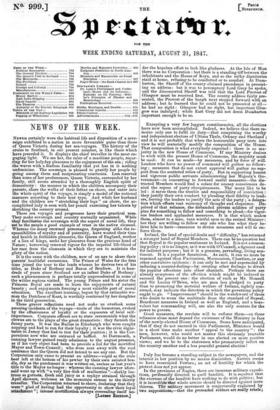NEWS OF THE WEEK.
NEVER certainly were the habitual life and disposition of a sove- reign exhibited to a nation in more favourable guise than those NEVER certainly were the habitual life and disposition of a sove- reign exhibited to a nation in more favourable guise than those of Queen Victoria during her sea-voyages. The history of the cruise to Scotland, in our present number, is like those which have preceded it. It displays the chief traveller in the most en- gaging light. We see her, the ruler of a maritime people, recur- ring for her holyday pleasures to the enjoyment of the sea ; riding the waves with a fearless familiarity that yet has in it nothing unfeminine. The sovereign is pleased to gratify her people by going among them and reciprocating courtesies. Less reserved than some of her predecessors, Queen Victoria, surrounded by her family, still seems attended by a thoroughly English spirit of domesticity: the manner in which the children accompany their parents, share the walks of their father on shore, and enter into the whole spirit of the voyage is simply a model of the national manners according to their best type. And while her husband and the children are "stretching their legs" on shore the ac- complished lady is seen with her pencil exercising her talents by sketching the scenery around.
These sea voyages and progresses have their practical uses. They make sovereign and country mutually acquainted. While they familiarize the sovereign with the aspect of naval-life, they set to the people a good example of trust in the native element. Whereas too many crowned personages, forgetting alike the re- sponsibilities of royalty and of paternity, have wasted their time and health in forbidden pleasures, the Queen of England, mother of a line of kings, seeks her pleasures from the gracious hand of Nature ; borrowing renewed vigour for the imperial life-blood of her race from the elements in which they are to maintain the glory of the nation. It is the same with the children, now of an age to share their parents' healthful excursions. The Prince of Wales for the first time joined the tour to the lands whence he derives two of his titles, as Duke of Rothsay and Baron of Renfrew. It is hun- dreds of years since Scotland saw an infant Duke of Rothsay ; such a plitenomenon is perhaps totally unprecedented in some of the wilder regions visited. The young Prince and his sister the Princess Royal are made to learn the enjoyments of natural beauty ; such enjoyments forming a most valuable part of moral education. The exce)lent training, begun by that estimable wo- man the Dutchess of Kent, is worthily continued by her daughter in the third generation. These graver reflections need not make us overlook some
amusing incidents of the voyage—traits of the humorous, evoked by the effusiveness of loyalty or the exposures of local self- importance. Corporate officers are to state ceremonials what the clowns are to the plays of the Freat dramatists : they furnish the funny parts. It was the Bathes in Edinburgh who were caught napping and had to run for their loyalty ; it was the civic digni- taries in Jersey that had to trot for their position; it is the (or- porations now who are outraced or baffled. At Dartmouth, a cunning lawyer gained ready admission to the august presence, as if his very object had been to provide a foil for the mortified Mayor and town-Council; who were sent away with the cool assurance that the Queen did not intend to see any one. But the Corporation only came to present an address—vapid as the stale beer left at the bottom of his pewter by their own satiated bea- elle, dry as the parchment it was written on, useless as last year's title to the Mayor no longer : whereas the cunning lawyer afore- said went up with "a very fine dish of mulberries "—darkly lus- trous as garnets, fresh and juicy as a zephyr strained through April showers, welcome as the mountain stream to the thirsty traveller. The Corporation returned to shore, declaring that they were" glad of having had the opportunity to show their loyal itStadament "; intense mortification always concealing itself un-
der the hopeless effort to look like gladness. At the Isle of Man there was no Corporation : but there is a standing tiff between the inhabitants and the House of Keys, and so the sulky dignitaries staid at home, refusing to be comforted or to comfort. At Dum- barton, the Sheriff of the county claimed precedence in present- ing an address: but it was to peremptory Lord Grey he spoke, and the disconcerted Sheriff was told that the Lord Provost of Glasgow must be received first. The county address fairly pre- sented, the Provost of the burgh next stepped forward with an address ; but he learned that he could not be presented at all— he had no right: Glasgow had no right, but important Glas- gow was indulged; while Earl Grey did not deem Dumbarton important enough to be so.


























